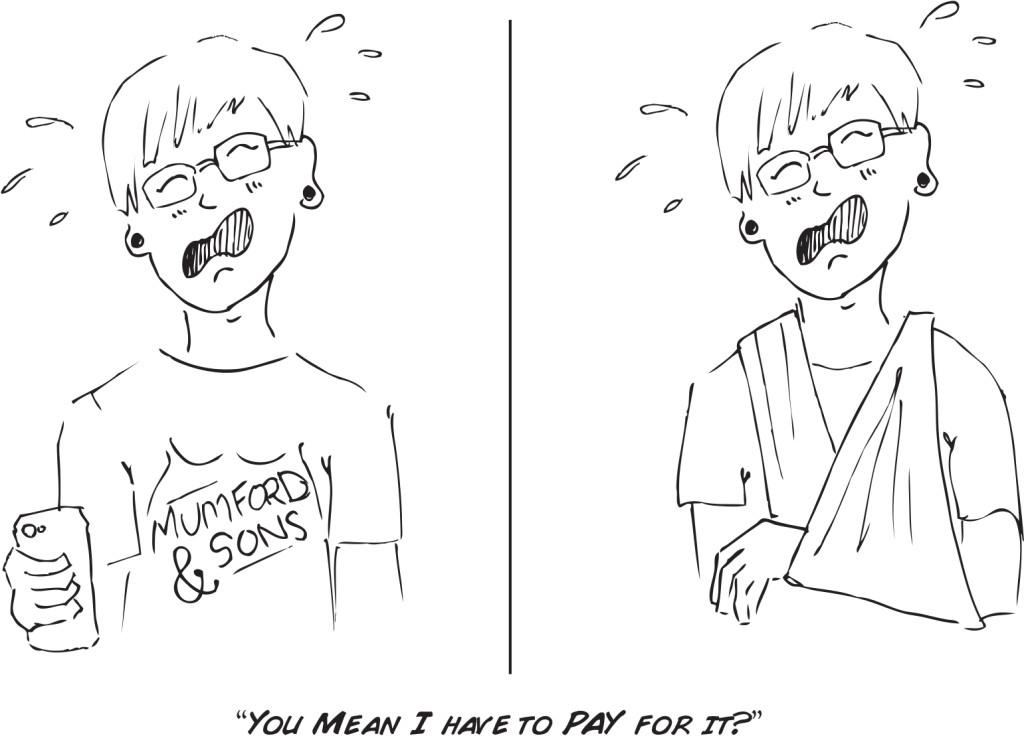Millennials need to care about health care: College-age Americans play a greater role in the success of Obamacare than they think
November 13, 2013
Just last week, USA Today published a column titled, “Obamacare options grim for young people.” The article echoed the same old anti-Obamacare arguments. But it was compelling.
Why? Its author is a Millennial and was speaking from the awkward spot in which young people have been placed: Although most of us are still healthy, we we will soon be responsible for buying our own health insurance or paying a fine.
Most of the commentary on Obamacare’s reliance on young people has come from those with pre-existing conditions, multiple prescriptions, and those maybe a couple surgeries deep. We support Obamacare–not necessarily because we know it will work, but because we believe we’re more than a bunch of self-involved brats.
But for balance, we’ll quote the other side of our generation:
“My lack of enthusiasm for signing up has to do with the unappealing options health care reform has presented my generation,” Katrina Trinko, the young USA Today author, wrote. She explained that young people will “pay for the elderly,” facing higher premiums–an expected 27 percent increase in California, according to Forbes—to subsidize senior citizens and the terminally ill. Trink explained that these premiums are outrageous, considering the low incomes of 25- to 34-year-olds—$65,041 in 2012, according to the Census Bureau.
Slightly more melodramatic, 26-year-old Ashley Dionne wrote of Obamacare, “This law has raped my future.” A classic Millennial, Dionne earned two undergraduate degrees only to find herself working at a gym. Like Trink, Dionne’s panic has been raised by an increased health care premium. But unlike Trink, Dionne has a list of health issues and feels that $319 a month, as opposed to $75 with her “Young Adult Plan,” is an outrageous, future-raping price.
Nevertheless, the 26-year-old fails to acknowledge that people making less than $15,088 a year qualify for Medicaid starting in April, and that their increased premiums shouldn’t be astronomical–at best nonexistent.
There’s a bigger picture these Millennials miss. Obamacare has arrived at a time when our generation is trying to reinvent its character. The classic stereotype of a Millennial is a narcissistic, smartphone wielder. According to Jean M. Twenge, author of “Generation Me,” for those who “have been consistently taught to put their own needs first and to focus on feeling good about themselves.”
This stereotype may explain Trinko’s concluding statement: “If young adults choose to voluntarily give their hard-earned money to their elders — whether grandparents, neighbors or friends — to help with medical costs, that’s their prerogative. But it should be their choice, not another burden forced on them by the Boomers and their ilk.”
In contrast, William Strauss and Neil Howe argue in their book “Millennials Rising: The Next Great Generation,”our generation is not so much entitled brats, but civic-minded, institution builders. Strauss and Howe write: “Their life mission will not be to tear down old institutions that don’t work, but to build up new ones that do.”
In an earlier book, “Generations: The History of America’s Future, 1584 to 2069,” Strauss and Howe place each generation into four distinct archetypes–prophet, hero, nomad, and artist– with each repeating continuously in the same sequence. According to the authors, Millennials would become the next “hero” generation and–in the words of Eric Hoover from his article, “The Millennial Muddle”–“destined for coming-of-age triumphs, intent on taking action and building community, just like the ‘G.I. Generation’ decades before.”
Coincidentally, the G.I. Generation (or the “Greatest Generation”) were those who experienced similar ambivalence over the Social Security Act, a social reform comparable to the Affordable Healthcare Act in its rough introduction and levels of opposition. In the end, however, Social Security didn’t leave the G.I. Generation up the creek. Rather, that generation is now collecting Social Security checks that either aid or completely support their retirement.
But it turns out that, so far, more Millennials support Obamacare than originally expected. According to the Washington Post, of the 25,000 Marylanders who have signed up for Obamacare, the largest percentage were between the ages of 25 to 29.
So, fellow Millennials, it’s decision time. Will we carry a mindset that will ultimately define our generation as entitled screen-touchers, or will we decide to build, support and create, thinking about those both ahead of and behind us? Will we be another Generation Me, or will be the next “Heroes”?






































































